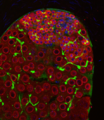Fusome
Fusome is a term from microbiology that describes a way different cells communicate with each other. Fusomes are simple openings, or pores, in the walls of certain types of cells. These allow certain chemical compounds to pass through.
Dictionary definition
“Fusome (Hirschler 1948) – intercellular bridges in various tissues wich undergo a common synchnonous development. Unlike the other intrcellular complexes such as → desmosomes and → plasmodesmata, the fusomes merely consist single, large annular openings in the cell wall. Electrom microscope observations support the theory that these bridges allow the free passage of cytoplasmic materials, including the mitochondria. The fusomes are probably the result of incomplete cell division where the annual furrow of the spindle residual-body does not divide completely durig → cytokinesis. The fusosomes show a strongly osmophylic anular thickening around the opening.“[1][2]
Fusome Media
Related pages
References
- ↑ Rieger, R.; Michaelis, A.; Green, M.M. (2012). Glossary of Genetics and Cytogenetics: Classical and Molecular. Springer Science & Business Media. ISBN 978-3-642-96327-8.
- ↑ Rieger, Rigomar; Michaelis, Arnd; Green, Melvin M. (1976). Glossary of genetics and cytogenetics: Classical and molecular. Berlin – Heidelberg - New York: Springer-Verlag. ISBN 978-3-540-07668-1.

